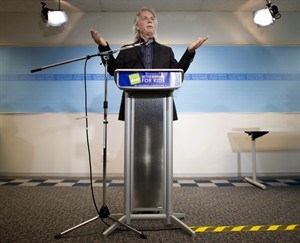
British Columbia Teachers Federation President Jim Iker addresses a news conference in Vancouver, Monday, Sept. 8, 2014. THE CANADIAN PRESS/Jonathan Hayward
Republished September 08, 2014 - 5:58 PM
Original Publication Date September 08, 2014 - 1:05 AM
VANCOUVER - British Columbia's teachers' union is forging ahead in its pursuit of binding arbitration to end its ongoing strike with a provincewide vote in an attempt to bring around a government that's rejected the offer twice.
The education minister has dismissed the move as a "ploy" and challenged the B.C. Teachers' Federation to instead ask members to agree to suspend their job action while negotiations proceed.
The start of a second week of strike action by more than 40,000 teachers, affecting some 558,000 students, began with another round of duelling news conferences that left no indication a settlement will come soon.
The union says it will convene teachers at their locals for a vote on Wednesday, urging them to approve the third-party settlement method and promising to promptly reopen schools if government agrees to the proposal.
"Are there risks for us in binding arbitration? Absolutely, we know that," union president Jim Iker told reporters Monday in Vancouver.
"What the settlement will be is what the arbitrator will deem is the fair settlement for our teachers. And that's the commitment we're making."
Hours later, Peter Fassbender declined for a second time in three days to hand over decision-making to an independent arbitrator and accused the federation of calculating that the government wouldn't budge.
"I believe that the BCTF executive knew when they called for (arbitration) that this government would not agree," he told reporters in Victoria, adding he felt as though he was in the film Groundhog Day, where the same day repeats over and over.
"It is clear to me that this is an attempt to deflect any responsibilities from themselves and put it all on the government."
Fassbender said the government is not considering any option other than a negotiated settlement and panned the arbitration plan by explaining a past attempt at that route ended up compelling the government to raise taxes. He repeated that the government will not legislate a settlement.
The union said Iker spent nine hours outlining its detailed proposal on the weekend with the government's chief negotiator, Peter Cameron, and veteran mediator Vince Ready. The government complained it has yet to receive a written copy.
The union's framework for settlement, handed out to media and posted online, states its willingness to give over to an arbitrator unresolved items including salary, signing bonus, extended health benefits and dental, teaching-on-call issues, pregnancy leave top-up and preparation time.
In a change from last week's proposal, the union also said it would leave its request for a new, $225 million fund to hire more specialist teachers to the decision-maker. But it continued to renounce a contentious clause relating to the bargaining of classroom conditions and stipulated that scrapping "E80" was a pre-condition to entering binding arbitration.
Fassbender reaffirmed the government's assertion last week that the employer wants to bargain class size and composition issues, which has been a major sticking point. But he repeated that can only happen when the union is no longer demanding "double" in the wages and benefits that other public sector unions have negotiated.
Finance Minister Mike de Jong said Monday that if the government accepted the union's current proposal, it would cost every B.C. property owner another $200 dollars annually.
The Opposition New Democrats weighed in on the dispute, just weeks before the legislature resumes, calling on the government to accept the union's terms.
Leader John Horgan asserted the government has money in its budget, or, can raise enough money to sweeten the pot. He didn't mention raising taxes outright, saying it's the job of government to find ways to solve difficult issues.
"There's enough money for this," said Horgan. "Government's responsibility is to manage the affairs of the public. That's why we're here."
— With files from Dirk Meissner in Victoria.
Follow @TamsynBurgmann on Twitter
News from © The Canadian Press, 2014